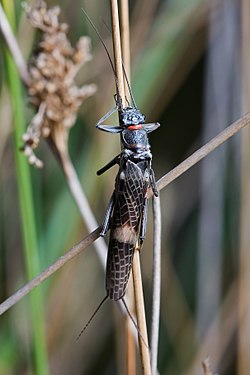Plecoptera
| Plecoptera Temporal range: Permian–Recent
| |
|---|---|

| |
| Eusthenia sp. | |
| Scientific classification | |
| Domain: | Eukaryota |
| Kingdom: | Animalia |
| Phylum: | Arthropoda |
| Class: | Insecta |
| (unranked): | Dicondylia |
| Subclass: | Pterygota |
| Infraclass: | Neoptera |
| Cohort: | Polyneoptera |
| Order: | Plecoptera Burmeister, 1839 |
| Suborders | |
|
mostly Arctoperlaria: see text | |
Plecoptera is an order of insects commonly known as stoneflies. Some 3,500 species are described worldwide,[1] with new species still being discovered. Stoneflies are found worldwide, except Antarctica.[2] Stoneflies are believed to be one of the most primitive groups of Neoptera, with close relatives identified from the Carboniferous and Lower Permian geological periods, while true stoneflies are known from fossils only a bit younger. Their modern diversity, however, apparently is of Mesozoic origin.[3]
Plecoptera are found in both the
All species of Plecoptera are intolerant of water pollution, and the presence of their nymphs in a stream or still water is usually an indicator of good or excellent water quality.[5]
Description and ecology


(Gripopterygidae: Dinotoperlinae)
Stoneflies have a generalized anatomy, with few specialized features compared to other insects. They have simple
The name "Plecoptera" literally means "
A few wingless species, such as the
The nymphs (technically, "naiads") are aquatic and live in the benthic zone of well-oxygenated lakes and streams. A few species found in New Zealand and nearby islands have terrestrial nymphs, but even these inhabit only very moist environments. The nymphs physically resemble wingless adults, but often have external gills, which may be present on almost any part of the body. Nymphs can acquire oxygen via diffusing through the exoskeleton, or through gills located on behind the head, on the thorax, or around the anus.[10] Due to their nymph's requirement for well oxygenated water, the species is very sensitive to water pollution. This makes them important indicators for water quality.[11] Most species are herbivorous as nymphs, feeding on submerged leaves and benthic algae, but many are hunters of other aquatic arthropods.[6]
Life cycle
The female can lay up to one thousand eggs. It will fly over the water and drop the eggs in the water. It also may hang on a rock or branch. Eggs are covered in a sticky coating which allows them to adhere to rocks without being swept away by swift currents.[12] The eggs typically take two to three weeks to hatch, but some species undergo diapause, with the eggs remaining dormant throughout a dry season, and hatching only when conditions are suitable.[6]
The insects remain in the nymphal form for one to four years, depending on species, and undergo from 12 to 36 molts before emerging and becoming terrestrial as adults.[13] Before becoming adults, nymphs will leave the water, attach to a fixed surface and molt one last time.
The adults generally only survive for a few weeks, and emerge only during specific times of the year when resources are optimal. Some do not feed at all, but those that do are herbivorous.[6] Adults are not strong fliers and generally stay near the stream or lake they hatched from.[12]
Phylogeny
A summary of the phylogeny of stoneflies is shown below. While the Antarctoperlaria, Arctoperlaria, Euholognatha, Systellognatha are well supported, several further relationships are disputed.[14][15][16] Some families have only been analyzed by one study (indicated by dashed lines) and their placement may change in the near future.
| Plecoptera |
| ||||||||||||
Notes
- monophyletic and this species is suspected to belong elsewhere.[8]
References
- ISBN 978-1-4020-8258-0.
- ^ Brittain, 1987
- ^ PMID 10761594.
- ISBN 978-0-900386-28-2.
- ^ Nelson, Riley. "Clean water has bugs in it, says BYU Biology Professor Riley Nelson". Archived from the original on 6 September 2015. Retrieved 16 May 2013.
- ^ ISBN 978-0-19-510033-4.
- ^ S. C. Woodhouse (1910). English-Greek Dictionary - a Vocabulary of the Attic Language. London: George Routledge & Sons.
- ^ C. Riley Nelson (January 1, 1996). "Capniidae. Winter Stoneflies". Tree of Life Web Project. Retrieved July 31, 2008.
- ^ E. M. Holst (2000). "Lake Tahoe benthic stonefly (Capnia lacustra)" (PDF). In D. D. Murhy; C. M. Knopp (eds.). Lake Tahoe Watershed Assessment (PDF). United States Department of Agriculture. pp. O–118 – O–120.
- ^ "ENT 425 | General Entomology | Resource Library | Compendium [plecoptera]". www.cals.ncsu.edu. Retrieved 2016-02-23.
- ^ "Plecoptera - Stoneflies -- Discover Life". www.discoverlife.org. Retrieved 2016-02-23.
- ^ a b "ENT 425 | General Entomology | Resource Library | Compendium [plecoptera]". www.cals.ncsu.edu. Retrieved 2016-04-12.
- ^ "Order Plecoptera - Stoneflies - BugGuide.Net". bugguide.net. Retrieved 2016-04-12.
- PMID 30876966.
- .
- PMID 33262442.
External links
 Media related to Plecoptera at Wikimedia Commons
Media related to Plecoptera at Wikimedia Commons Data related to Plecoptera at Wikispecies
Data related to Plecoptera at Wikispecies- Plecoptera Species File: order Plecoptera (Version 5.0/5.0)

